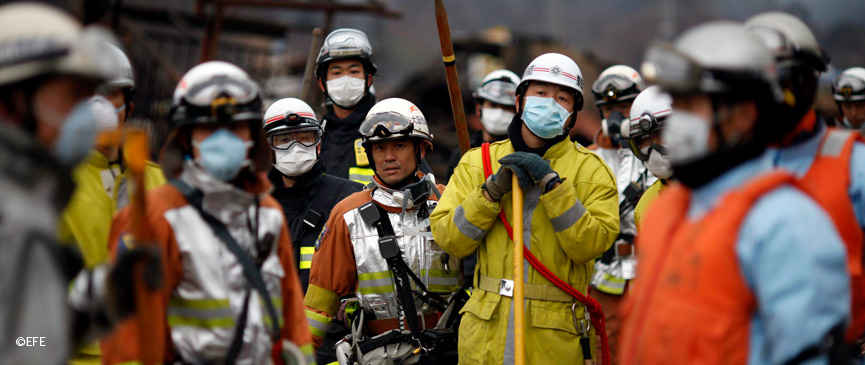The Princess of Asturias Foundation
Sección de idiomas
Fin de la sección de idiomas
Sección de utilidades
Fin de la sección de utilidades
- The Foundation
- HM The King
- HRH The Princess of Asturias
- 2023 Special
- Princess of Asturias Awards
- Area of Communication and Media
- Music Department
- Exemplary Town of Asturias Award
- 2012 Special
- 2013 Special
- 2014 Special
- 2015 Special
- 2016 Special
- 2017 Special
- 2018 Special
- 2019 Special
- 2020 Special
- 2021 Special
- 2022 Special
-
Important: COVID-19
-
Terms of Use
You are in:
Laureates
Start of main content
Heroes of Fukushima
Prince of Asturias Award for Concord 2011

Following the massive earthquake and tsunami that occurred in north-eastern Japan on March 11, 2011 and which caused around 28,000 deaths and displaced some 350,000 people, Fukushima nuclear power plant suffered significant damage resulting in hydrogen explosions and fusion of nuclear fuel. The International Atomic Energy Agency and the Japanese government initially placed the alert levels between 5 and 6 on a scale of 7, and finally at 7, as after the Chernobyl accident.
Despite major uncertainty regarding the development of the nuclear emergency, the different groups that worked for weeks in Fukushima did so under extreme conditions (high radiation, continuously rotating shifts and only a few hours of rest, and limited supplies of food and drinking water). Despite these grave consequences, they continued to participate in the efforts to regain control of the nuclear plant, aware of how essential their work was to prevent a catastrophe of even greater magnitude.
The work was carried out by different groups of people: employees of the Tokyo Electric Power Company (TEPCO), the plant’s operator; of its 130 workers, 50 volunteered, as did some workers who had already retired or were nearing retirement, and, after increasing the number of rotating shifts and the needs for personnel, additional staff was hired (by May 3, 1,312 workers had intervened in Fukushima); fire fighters from various prefectures, especially from Tokyo, who participated in the work of cooling the reactors, a key task to restore control of the plant; and the police forces and Self-Defence Forces of Japan, whose work cooling the reactors by launching water from helicopters, inspecting the damage from the air, cordoning off the exclusion area and evacuating people when the reactors emitted very high doses of radiation was very important.
The behaviour of these people has also embodied the values most deeply rooted in Japanese society, such as the sense of duty, personal and family sacrifice for the greater good and dignity in the face of adversity, humility, generosity and courage.
End of main content
Sección de utilidades
Fin de la sección de utilidades
- Legal document Legal document (Access key 8)
- | Privacy policy Privacy policy (Access key )
- | Social networks ???en.portal.pie.menu107.title???
- | Cookies ???en.portal.pie.menu110.title???
- | Site map Site Map (Access key 3)
- | Contact Contact (Access key )
- | XHTML 1.0
- | CSS 2.1
- | WAI 'AA
© Copyright 2024. FUNDACIÓN PRINCESA DE ASTURIAS
 View interactive
View interactive


